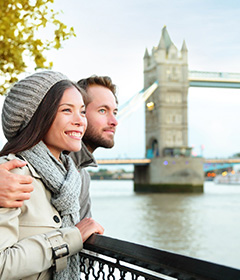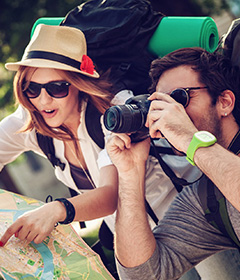Holiday experiences possess a unique power to mould our memories and transform our sense of self. These journeys, whether to distant lands or nearby retreats, create indelible impressions that linger long after the suitcases are unpacked. The interplay between novel environments, cultural immersion, and heightened emotional states during holidays catalyses profound changes in our neural pathways and self-perception. This exploration delves into the intricate mechanisms by which holiday experiences become woven into the fabric of our memories and identity, shaping who we are and how we view the world.
Neuroplasticity and memory formation during holiday experiences
The human brain’s remarkable ability to reorganise itself, known as neuroplasticity, is particularly active during holiday experiences. When you encounter new environments, engage with unfamiliar cultures, or participate in novel activities, your brain forms new neural connections at an accelerated rate. This heightened state of neuroplasticity enhances memory formation and retention, making holiday experiences especially impactful on your cognitive landscape.
Research indicates that the novelty and intensity of holiday experiences trigger the release of neurotransmitters such as dopamine and norepinephrine. These chemicals play crucial roles in memory consolidation, effectively ‘stamping’ these experiences into your long-term memory. As a result, you’re more likely to vividly recall details from your holidays compared to routine daily activities.
Moreover, the multi-sensory nature of holiday experiences contributes significantly to memory formation. The sights, sounds, smells, tastes, and tactile sensations you encounter create a rich tapestry of sensory inputs. Your brain integrates these diverse stimuli, forming complex, interconnected memories that are more resilient and easier to recall.
Cultural immersion and identity transformation
Holiday experiences that involve cultural immersion can profoundly impact your identity. When you engage with different cultures, you’re exposed to alternative worldviews, values, and ways of life. This exposure challenges your existing beliefs and assumptions, potentially catalysing significant shifts in your self-concept and worldview.
Linguistic acquisition and cognitive restructuring
Language learning during holidays is a powerful agent of cognitive restructuring. When you attempt to communicate in a foreign language, even at a basic level, you’re not just acquiring new vocabulary; you’re rewiring your brain to think in different patterns. This process can lead to enhanced cognitive flexibility and a broader perspective on communication and cultural nuances.
Studies have shown that even short-term language immersion during holidays can improve executive function and decision-making skills. As you navigate linguistic challenges, your brain becomes more adept at problem-solving and adapting to new situations, skills that often persist long after the holiday has ended.
Gastronomic encounters and sensory memory integration
Culinary experiences during holidays play a significant role in memory formation and identity shaping. The act of tasting unfamiliar dishes engages multiple senses simultaneously, creating vivid sensory memories. These gastronomic encounters often become anchors for broader holiday memories , with specific flavours or aromas triggering recollections of places, people, and experiences.
Furthermore, embracing local cuisines can lead to a transformation in your food identity. You might discover new favourite dishes, develop an appreciation for previously unfamiliar ingredients, or adopt cooking techniques that become part of your culinary repertoire. These gastronomic shifts can influence your daily life long after the holiday, subtly altering your identity through changed eating habits and food preferences.
Ritual participation and value system recalibration
Participating in local rituals or cultural practices during holidays can prompt a recalibration of your value system. Whether it’s observing a religious ceremony, taking part in a traditional festival, or engaging in local customs, these experiences offer insight into different ways of perceiving and interacting with the world.
This exposure to alternative value systems can lead to a re-evaluation of your own beliefs and priorities. You might find yourself adopting new perspectives on community, spirituality, or the balance between work and leisure. Such shifts in values can have a lasting impact on your identity, influencing decision-making and lifestyle choices long after you’ve returned home.
Cross-cultural interactions and Self-Concept evolution
Holiday experiences often involve interactions with people from diverse cultural backgrounds. These cross-cultural exchanges can challenge your preconceptions and broaden your understanding of human diversity. As you navigate these interactions, you may find your self-concept evolving, becoming more inclusive and globally oriented.
Moreover, these interactions can lead to a phenomenon known as ‘culture shock’, which, despite its potentially uncomfortable nature, can be a catalyst for personal growth. Overcoming culture shock requires adaptability and open-mindedness, traits that, once developed, become integral parts of your identity.
Environmental factors in holiday memory consolidation
The physical environment of your holiday destination plays a crucial role in memory consolidation and identity formation. Novel geographical settings, climatic variations, and changes in your daily routines all contribute to the creation of distinct and lasting memories.
Circadian rhythm disruption and memory encoding
Travel across time zones can disrupt your circadian rhythm, a phenomenon commonly known as jet lag. While often viewed as a nuisance, this disruption can actually enhance memory encoding. The heightened alertness and altered sleep patterns associated with jet lag can lead to more vivid and detailed memory formation during the initial days of your holiday.
Research suggests that moderate stress levels, such as those induced by circadian rhythm disruption, can enhance the brain’s ability to form and consolidate memories. This biological response may explain why the first few days of a holiday often feel more memorable and impactful on your sense of self.
Novel geographical settings and spatial memory enhancement
Exploring new geographical environments during holidays stimulates your spatial memory and navigation skills. As you navigate unfamiliar streets, landmarks, and landscapes, your brain creates detailed cognitive maps. This process not only enhances your spatial awareness but also contributes to a sense of accomplishment and self-efficacy.
The act of orienting yourself in a new place can be a metaphor for finding your place in the world. As you successfully navigate foreign environments, you may experience a boost in confidence and adaptability, traits that can become integral to your evolving identity.
Climate variation and physiological memory triggers
Experiencing different climates during holidays can create strong physiological memory triggers. The sensation of tropical humidity, the crisp air of mountain altitudes, or the dry heat of a desert can become powerful memory cues. These climatic experiences are often associated with specific emotions and events, creating a complex web of sensory and emotional memories.
Moreover, adapting to different climates can challenge your physical comfort zones, potentially leading to increased resilience and adaptability. This physiological adaptation process can contribute to a more flexible self-image and enhanced coping skills.
Emotional intensity and autobiographical memory formation
Holiday experiences are often characterised by heightened emotional states. Whether it’s the excitement of exploring a new city, the awe inspired by natural wonders, or the joy of shared moments with travel companions, these intense emotions play a crucial role in autobiographical memory formation.
Emotional experiences activate the amygdala, a brain region crucial for memory consolidation. This activation enhances the vividness and longevity of memories associated with those emotions. Consequently, emotionally charged holiday experiences often become key chapters in your life story, significantly influencing your sense of self and personal narrative.
Emotional memories formed during holidays can become touchstones of identity, serving as reference points for personal growth and self-understanding.
Furthermore, the novelty and intensity of holiday experiences can lead to what psychologists call ‘flashbulb memories’ – exceptionally vivid, detailed memories of significant events. These memories, often associated with strong emotions, can become defining moments in your personal history, shaping how you view yourself and your life trajectory.
Social dynamics and collective memory construction
The social context of holiday experiences plays a vital role in memory formation and identity development. Whether travelling solo, with family, or in a group, the social dynamics of your journey significantly influence how memories are formed and later recalled.
Group cohesion effects on shared experience recollection
When travelling with others, a phenomenon known as ‘collaborative remembering’ often occurs. This process involves the collective reconstruction of shared experiences through conversation and storytelling. As you and your travel companions reminisce about your holiday, you co-create a narrative that becomes part of your shared history.
This collaborative memory construction can strengthen social bonds and contribute to a sense of collective identity. The shared experiences and inside jokes that emerge from holiday adventures often become integral parts of group dynamics, influencing how you relate to each other long after the trip has ended.
Social media documentation and digital memory alteration
In the digital age, social media plays a significant role in how holiday memories are recorded and shared. The act of documenting your experiences through photos, videos, and status updates can influence how you perceive and remember your holiday. This digital documentation creates a curated version of your experiences, which can sometimes diverge from your actual lived experience.
Research suggests that the process of sharing holiday experiences on social media can alter memory formation and recall. The feedback received through likes, comments, and shares can reinforce certain aspects of your experience, potentially amplifying their perceived importance in your memory and self-narrative.
Intergenerational travel and family narrative development
Holiday experiences shared across generations can play a crucial role in developing and reinforcing family narratives. When different generations travel together, there’s an opportunity for the transmission of family history, values, and traditions. These shared experiences contribute to a sense of continuity and belonging within the family unit.
Moreover, intergenerational travel can lead to role reversals and new perspectives on family dynamics. Adult children might take on caretaking roles for elderly parents, or grandparents might form unique bonds with grandchildren outside of their usual context. These experiences can reshape family identities and individual roles within the family structure.
Post-holiday integration and Long-Term identity shifts
The impact of holiday experiences on memory and identity doesn’t end when you return home. The process of integrating these experiences into your daily life can lead to long-term shifts in perspective, behaviour, and self-concept.
Many travellers report experiencing a period of ‘reverse culture shock’ upon returning home. This phenomenon can prompt a re-evaluation of your home culture and lifestyle, potentially leading to changes in your values, priorities, and daily habits. For instance, you might adopt new dietary preferences, incorporate relaxation techniques learned during your holiday, or seek out opportunities to maintain connections with the cultures you encountered.
The memories and insights gained from holiday experiences often serve as catalysts for personal growth and life changes. You might find yourself more open to new experiences, more tolerant of differences, or more motivated to pursue long-held dreams. These subtle shifts in attitude and behaviour can accumulate over time, gradually transforming your identity and life trajectory.
Furthermore, the act of sharing your holiday stories with others can reinforce and reshape your memories. As you narrate your experiences, you engage in a process of meaning-making, often highlighting aspects that align with your evolving self-image. This storytelling process not only helps consolidate your memories but also contributes to the ongoing construction of your personal narrative and identity.
In conclusion, holiday experiences are far more than mere breaks from routine; they are powerful shapers of memory and identity. Through neuroplasticity, cultural immersion, environmental influences, emotional intensity, and social dynamics, these experiences become woven into the fabric of who you are. As you embark on future journeys, consider not just the destinations you’ll visit, but the ways in which these experiences might transform your memories, perspectives, and sense of self.


